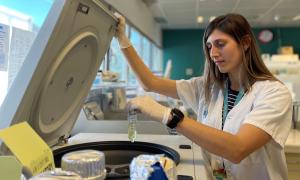Preventing SARS-CoV-2 infection thanks to a bacterial-derived molecule

This molecule, called Cyanovirin-N, binds to the SARS-CoV-2 Spike protein, similarly to antibodies generated by vaccines, and blocks the entry of the virus into cells
With the administration of the first vaccines against SARS-CoV-2 globally, the risk of death in the population decreased markedly, as did the severe course of COVID-19. However, curbing the transmission and infectivity of this virus is still a major task for the scientific community. With this in mind, an international scientific team led by the National Cancer Institute of the United States, and with the participation of the IrsiCaixa AIDS Research Institute –a centre jointly promoted by the "la Caixa" Foundation and the Department of Health of the Generalitat de Catalunya, the University of Lleida-Agrotecnio CERCA Center and EMBRAPA (Brazil), has published a study in the Proceedings of the National Academy of Sciences (PNAS) journal in which they demonstrate the efficacy of a molecule called Cyanovirin-N in inhibiting the infection of several SARS-CoV-2 variants, especially Delta and Omicron. To do so, the molecule binds to the Spike protein of the virus and blocks its function by preventing the virus from entering cells. Cyanovirin-N is a protein produced by bacteria and has previously been shown to be effective in preventing viruses such as Ebola, influenza, hepatitis C and HIV from entering cells. "Until now, there were no studies showing that Cyanovirin-N was also effective in preventing SARS-CoV-2 infection, not only in cell cultures in the laboratory, but also in animal models", explains Jordana Muñoz-Basagoiti, first author of the article.
Preventing infection with different variants of SARS-CoV-2
The emergence of new variants of SARS-CoV-2, increasingly transmissible and with a greater capacity to escape the immune response induced by vaccines, has accelerated the need to design complementary strategies to prevent infection caused by this virus. "Thanks to this international study we have been able to show that Cyanovirin-N would be a potential tool against SARS-CoV-2", according to Nuria Izquierdo-Useros, principal investigator at IrsiCaixa. The researchers have been able to demonstrate these results in animal models and have observed a reduction of the viral load in the nasal cavities and lungs.
The scientific team has shown that Cyanovirin-N is twice as effective in blocking the Omicron variant compared to the original SARS-CoV-2 variant. "The structure of the Spike protein to which Cyanovirin-N binds is very conserved and this is a huge advantage because the effectiveness of Cyanovirin-N is not compromised by the appearance of new variants of the virus", Izquierdo-Useros explains.
Cyanovirin-N as a complementary strategy to vaccines
Cyanovirin-N binds to a different part of the SARS-CoV-2 Spike protein than the active ingredient of vaccines, antiviral drugs and monoclonal antibodies. Thus, this compound is entirely compatible and can complement other therapeutic strategies. "Cyanovirin-N has several advantages over vaccines. Its effect is more immediate since it is not necessary to wait for the immune system to generate antibodies. In addition, for people with immunodeficiencies, Cyanovirin-N would be a very good therapeutic option", says Julià Blanco, principal investigator at IrsiCaixa. "Large-scale production of Cyanovirin-N is viable and economical, even for low-income countries in particular when plant-based production systems are used”, adds Paul Christou, ICREA professor at the University of Lleida.
The next step would be to demonstrate the efficacy of this compound in humans through clinical trials, as has already been done with other molecules capable of preventing viral infections.